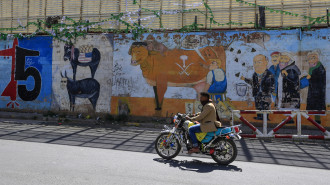
Israel's Hodeidah airstrike triggers severe environmental damage in Yemen

In many ways, the July 20 Israeli airstrike on the Yemeni port of Hodeidah was hardly a new development in Yemen’s decade-long, on-and-off civil war.
A growing number of regional and world powers have pounded the country from the skies in recent years, with the United Kingdom and the United States launching their own set of airstrikes just months ago.
Yet Israel’s involvement has threatened to widen the scale not only of Yemen’s conflict but also of its interlocking environmental issues, of which Hodeida has become the latest epicentre.
In the days after July 20, Agence France-Presse (AFP) reported that the Israeli airstrike had caused significant air, land, and water pollution.
The Israeli Air Force had bombed fuel tanks in Hodeidah in retaliation for a drone-based attack on Tel Aviv by the Houthis, who control much of Yemen’s north and west, including Hodeidah.
But the Israeli response may have the most immediate impact on Hodeidah’s civilians, who are breathing in its consequences.
The destruction of the fuel tanks caused a conflagration that filled the sky with smoke, with much of Hodeidah’s port still on fire four days after the airstrike.
The Yemeni group Mwatana for Human Rights also told AFP on July 24 that the bombing had triggered “a large oil spill from the burning fuel tanks into the sea” that “could cause significant environmental pollution in the marine environment as the leak is still ongoing.”
The group described the potential devastation as “widespread due to the large quantities of fuel that were stored.”
The Conflict and Environment Observatory (CEOBS), a British research institute, warned that “the fire and associated spills will have generated hazardous emissions to the air and substantial ground contamination with pollution to the marine environment likely."
Growing environmental crisis
Yemenis are hardly strangers to these kinds of environmental issues.
On July 17 — three days before the Israeli airstrike — CEOBS attributed an oil spill spanning much of the Red Sea to a leak from the Liberia-flagged oil tanker Chios Lion, which came under Houthi attack when sailing near Hodeidah.
As Israel’s brutal war on Gaza escalated, the Houthis have been targeting vessels passing by Yemen in a campaign against Israel and its Western allies, even if ships like Chios Lion have no apparent Israeli or military ties.
Experts have warned that pollution connected to attacks, like the Israeli airstrike, is jeopardising the health of the environment and the communities along Yemen’s coast.
This conflict-driven environmental degradation is extending the already-profound toll of the climate crisis for Yemen, which has been suffering some of global warming’s worst effects.
The United Nations has called climate change the cause of Yemen’s struggles with “rising temperatures, erratic rainfall patterns, and extreme weather events” responsible for “wreaking havoc on the environment, livelihoods, and health of the people.”
Shifts in Yemeni weather patterns have even facilitated the spread of pests such as locusts, which led to billions of dollars in agricultural losses in and around Yemen in 2020 according to the World Bank.
The cost could grow higher, with a 2023 report by the UN Development Programme estimating that Yemen’s gross domestic product will have lost $93 billion by 2060 because of climate change.
But Yemen’s environmental tragedy extends well beyond the economic damage.
The 2023 UN report also predicted that by 2060 climate change will have killed 121,000 Yemenis and left another 3.8 million facing malnutrition.
Many of the dangers are already clear today, with early August floods linked to extreme weather causing 30 deaths in Hodeida and displacing 500 Yemenis. The same floods claimed another 15 lives in the nearby city of Taiz.
Last year in Yemen, extreme weather such as cyclones and floods impacted tens of thousands.
Climate change is exacerbating and in some cases surpassing the devastation stemming from Yemen’s civil war.
A June analysis by Alternative Policy Solutions, an American University of Cairo think tank, determined that climate change displaced three times as many Yemenis as conflict in 2023. The report also noted that Yemen’s “most significant displacement events” between January and May 2024 resulted from climate change, not conflict.
“With the internationalisation of the civil war and political fragmentation, environmental issues have worsened significantly in the past decade,” scholar Helen Lackner wrote in an analysis for the Sanaa Center for Strategic Studies earlier this year.
Yet Israel’s involvement in Yemen brings unique potential for escalation. In the wake of Israel’s near-simultaneous July assassinations of a top Hamas official in Tehran and a senior Hezbollah commander in Beirut, the international community has been bracing for retaliation from Lebanon and Iran.
And while the Houthis have rarely featured in the latest warnings about a region-wide war, the possibility of Yemen getting caught in this imbroglio is far from remote, further risking wreaking havoc on Yemen’s environment.
Crippling water supply systems
Human rights groups, scholars, and the United Nations have documented how earlier airstrikes in Yemen’s civil war crippled the country’s water supply systems — a devastating blow when the UN has ranked Yemen as the 12th-most water-scarce country in the world.
Israel’s indiscriminate bombings in Gaza have ravaged the water supply and environment there, and the targeting of civilian facilities in Hodeidah suggests that Israel is just as willing to export this tactic to Yemen.
In the aftermath of the Israeli airstrike, Mwatana for Human Rights issued a statement calling for “an independent international investigation and urged the international community to take responsibility and act decisively to prevent the escalation of violence that could engulf the Middle East and the world in new cycles of atrocities and violations.”
Attention has continued to centre on Gaza, which to this day has been the main target of Israel’s airpower. Yet ignoring Yemen could allow it to become another front in a conflict where environmental degradation is not just a consequence of war, but also a weapon deployed against civilians.
The Mwatana statement pressed “the international community to rein in the Israeli war machine, which transitions the region from one horrifying conflict to another with impunity, despite being embroiled in a torrent of atrocities, bloodshed, and violations for over eight months.”
The fate of the environment and the Yemenis who rely on it could depend on whether the international community decides to intervene to prevent more airstrikes.






 Follow the Middle East's top stories in English at The New Arab on Google News
Follow the Middle East's top stories in English at The New Arab on Google News


